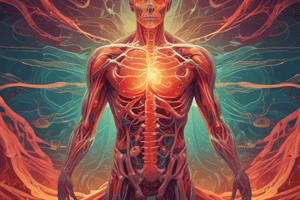Podcast
Questions and Answers
What is the primary function of the hypothalamus in thermoregulation?
What is the primary function of the hypothalamus in thermoregulation?
- Integrating thermoregulatory mechanisms (correct)
- Regulating sweating rate
- Producing heat through metabolism
- Stimulating muscle contraction
What are the four main mechanisms of heat exchange between the human body and the environment?
What are the four main mechanisms of heat exchange between the human body and the environment?
- Radiation, conduction, evaporation, and convection
- Conduction, convection, radiation, and evaporation (correct)
- Conduction, convection, respiration, and perspiration
- Respiration, perspiration, convection, and conduction
Which system is primarily responsible for regulating body temperature?
Which system is primarily responsible for regulating body temperature?
- Musculoskeletal system
- Autonomic nervous system (correct)
- Endocrine system
- Integumentary system
What is the purpose of thermoregulation in the human body?
What is the purpose of thermoregulation in the human body?
What is unique about the anatomical connections of the hypothalamus?
What is unique about the anatomical connections of the hypothalamus?
What is the primary mechanism of heat transfer involved when a person sits on a marble bench?
What is the primary mechanism of heat transfer involved when a person sits on a marble bench?
What happens to the molecules surrounding the body when a person immerses themselves in fresh water moved by currents?
What happens to the molecules surrounding the body when a person immerses themselves in fresh water moved by currents?
What is the minimum temperature required for a body to emit heat in the form of electromagnetic waves?
What is the minimum temperature required for a body to emit heat in the form of electromagnetic waves?
What is the energy required for a substance to pass from liquid to vapor state during evaporation?
What is the energy required for a substance to pass from liquid to vapor state during evaporation?
What is the primary mechanism of heat exchange involved in the thermal flow of the human body related to respiration?
What is the primary mechanism of heat exchange involved in the thermal flow of the human body related to respiration?
What is the effect of evaporation on the surrounding environment during thermal flow of the human body?
What is the effect of evaporation on the surrounding environment during thermal flow of the human body?
What is the primary mechanism of heat exchange involved in the thermal flow of the human body related to radiation?
What is the primary mechanism of heat exchange involved in the thermal flow of the human body related to radiation?
What is the effect of convection on the human body during thermal flow?
What is the effect of convection on the human body during thermal flow?
During thermal flow of the human body, what is the contribution of evaporation to the total heat exchange?
During thermal flow of the human body, what is the contribution of evaporation to the total heat exchange?
Why is evaporation an important mechanism of heat exchange in the human body?
Why is evaporation an important mechanism of heat exchange in the human body?
Flashcards are hidden until you start studying
Study Notes
Heat Exchange Mechanisms
- Human body exchanges heat with the surrounding environment through four main mechanisms:
- Conduction
- Convection
- Radiation
- Evaporation
Nervous Regulation of Body Temperature
- Regulation of body temperature involves the integration of responses of three systems:
- Autonomic nervous system
- Endocrine system
- Musculoskeletal nervous system
- Hypothalamus plays a crucial role in controlling body temperature due to its anatomical connections with these systems
- Hypothalamus integrates the set of thermoregulatory mechanisms to maintain effective control
Heat Exchange Mechanisms
- Heat exchange occurs through four mechanisms: conduction, convection, radiation, and evaporation.
Conduction
- Heat transfer between the body and a solid object with different temperature in contact with the body.
- Example: a person sitting on a marble bench.
Convection
- Heat transfer between a body and a fluid that moves around it.
- Example: immersing oneself in fresh water with currents, resulting in direct heat transfer to surrounding molecules.
Radiation
- All bodies with temperatures above absolute zero emit heat in the form of electromagnetic waves.
- Caused by constant molecular agitation.
Evaporation
- Passage of a substance from liquid to vapor state, requiring energy (latent heat of evaporation) from the surrounding environment.
- Results in cooling, such as on skin areas where evaporation occurs.
Thermal Flow of Human Body
- Evaporation is a peculiar mechanism of thermal dispersion in the human body.
- Three contributions to thermal flow due to evaporation:
- Er: energy required to produce water steam for release into the environment, primarily through respiration.
- Es: energy resulting from water evaporation from the skin, dependent on air's thermohygrometric degree, temperature, and skin temperature.
- Et: energy resulting from sweat evaporation, forming a water thin film on the skin that evaporates at the expense of thermal flow.
Studying That Suits You
Use AI to generate personalized quizzes and flashcards to suit your learning preferences.



